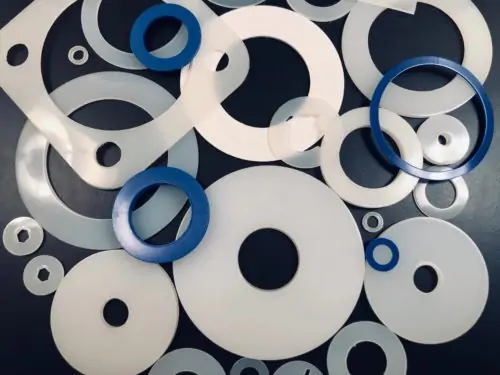Non-metallic stamping is the process of pressing a die through non-metallic material, such as thermoset, thermoplastics, or vulcanized fibre. Many industries are choosing this stamping process due to its ability to shape materials within tight tolerances and its cost-effectiveness. Non-metallic stamping produces parts such as plastic gaskets, fasteners, washers and much more.
The process of non-metallic stamping involves a high level of precision and attention to detail, which makes it imperative to use optimal machinery and have a team of highly experienced workers. To receive the best outcome, it’s essential to choose the right stamping provider for your needs.
One-Stop-Shop Manufacturing
Working with a manufacturer who can complete everything in-house comes with many benefits for the customer. A one-stop-shop that can deliver all required parts is much more convenient than working with multiple suppliers. One-stop-shop manufacturers optimize the design, production, and delivery processes of any manufacturing project. Some other key advantages of working with a one-stop-shop include:
- Quicker turnaround times: When you work with a single manufacturer, you gain the benefits of having a short supply chain, which includes reduced lead time. With everything being completed under one roof, the production process can move quickly through each stage, and there are no scheduling conflicts or long wait times to receive product shipments from multiple sources.
- Better communication: Custom manufacturing jobs can require special attention. Even a small issue can delay the entire project, so to get the best results, it’s important for everyone involved to have excellent communication. Partnering with a one-stop-shop means that everyone involved in your project can communicate directly with each other and resolve issues quickly.
- Lower costs: Having an in-house manufacturing process means that companies likely enjoy a lower price. One-stop-shops can offer cost-savings opportunities in many aspects of the manufacturing process, from packing, quality control, shipping, lead times, and more.
Various Portfolios of Non-Metallic Stamping Materials
Many significant developments have been made in metal stamping technology. These advancements have provided non-metallic alternatives to traditional metal stamping materials. Some of the most common non-metallic stamping materials that are used include:
- Vulcanized Fibre: This strong, lightweight material consists primarily of paper, wood pulp, and rag. In addition to being highly resistant to chemicals, solvents, and abrasion, it is also highly flexible, can withstand significant impacts, and has a high flammability rating. Vulcanized fibre performs well in high-stress environments and is available in grades such as commercial, electrical, bone fibre, trunk fibre, and wood laminating.
- Thermoplastics: Thermoplastics are non-metallic polymers that structurally change to become more gel-like when exposed to high temperatures or pressure. This allows them to be shaped into the desired part, and to be reshaped if desired. Thermoplastics can be manufactured quickly and consistently, with almost the same precision as metal components.
- Some of these at NPF include:
- Washers
- Discs
- Spacers
- Thermosets: Thermosets are a type of plastic that maintain their shape after the curing process and when exposed to high pressures and temperatures. This characteristic makes them ideal for high-heat applications such as printing systems, electrical component insulation, and general equipment insulation.
- Epoxy parts
- Custom Gaskets
Expert Quality Control and Production Management
Production management standards and quality control are two essential factors to take note of when choosing a non-metallic stamping provider. Having excellent quality control is vital to ensuring the customer receives products that are free from defects and will meet their needs. Additionally, having quality control practices in place makes a manufacturer less likely to deliver poorly made products or products that could be recalled. Many recalls could have been prevented with more effective quality control procedures.
It’s also imperative to consider the history of the manufacturer you are considering working with. Manufacturers with excellent production management track records are more likely to complete your project according to your specifications and on time.
When choosing the best non-metallic stamping provider, remember to consider factors such as experience and production capabilities. A manufacturer who can complete your project in-house can reduce delays and ensure easy communication so that your components arrive on time and on budget. Look for a manufacturer that can demonstrate clear quality control procedures as this is an important way to ensure you will get a final product that is free from any defects. If you’d like to learn more about the non-metallic stamping process, check out our eBook.
New Process Fibre is ISO certified and has been committed to delivering cost-effective in-house manufacturing services for over 90 years. To find out more about our non-metallic stamping services, please contact us, and to get started on your custom project, submit your request for a quote.


